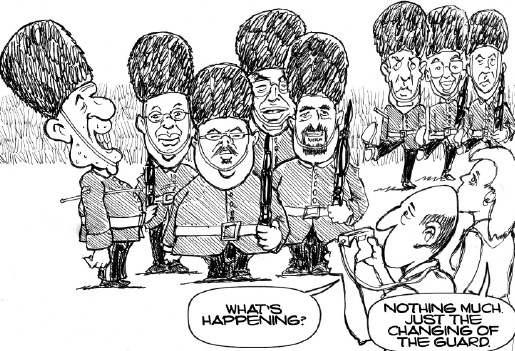
| EDITORIAL | Sunday, 10 February 2008 Defining change
The Labour Party has made change the central platform of its electoral campaign, and talking of “programmes for change that the country needs”. Labour emphasises the large-scale change in mentality that is required, claiming the Prime Minister is not in a position to engineer such a change. Labour’s platform for change is based on the Nationalist Party having been in government for far too long, ridden with the same old faces.
The project for change, as presented so far, looks little more than a promise for better management and administration of the country and placing good governance at the heart of government. A noble concept, egged on no doubt by the misbehaviour of certain ministers, yet hardly the shattering break with the past warranting the title of a new beginning. Of course a new Labour government will bring about a new Prime Minister in his second stint as the executive head of the country, a new Cabinet made up of many men and women that have years ago held high office, but effectively what new policies are we likely to see introduced? It is clear that with the passage of time and the increased process of globalisation, ideological differences between the parties have certainly diminished if not vanished. The common battle cry is to fight for the centre ground, hence the way taxation is the dominant issue in the campaign so far. The electoral campaign to date has centred on the taxation proposals which all of the four parties are putting to the people. So what change is Labour really calling for? Until defined, Labour risks projecting change just as a changing of the guard. This newspaper does not favour change just for the sake of change, or change at any cost, but rather would like to see change in the way we do politics, as promised when we became members of the European Union. We believe that change should be sold on potent arguments on the subject of why it should be brought about, and specifically what it will bring about, rather than the word change being used loosely. The project for change should involve further secularisation in the country, like the introduction of divorce or protective cohabitation laws and a revision of the church-state agreement; and not only, but more importantly electoral reform and the reform in party financing. Is Labour ready for these initiatives? To date Labour has merely widened the definition of the family and hidden behind civil society as the driver for change. A change would involve a commitment by the party that appoints government boards agencies and constituted bodies to be motivated by the value of meritocracy and not party affiliation. Is Labour ready to rise to the occasion and to overcome all pressures from party boys waiting anxiously in the wings for the day that Labour occupies the state? Labour has placed the environment very low on its priority list, leaving little to believe that real change, beyond cosmetic changes at MEPA, will take place. Is Labour willing to propose a constitutional change, which outlaws any development at all in outside development areas? In the few weeks left before polling day, Labour must explain further its policy on change by beefing it up with further explanations. The country can then look forward to a battle of ideas, an informed debate on whether the country is really being offered an opportunity to make a radical change or whether Labour’s change is simply a fine tuning exercise in the amelioration of the administration of the country with many of the policies of the present government maintained in tack. Is Labour simply for better management of the country, if not only, it is still in time to define its project for change. Our country needs a change in its priorities, which need to be clearly rethought. The priority should be: preserving the environment rather than further development; liberalising the rent laws rather than remaining passive in the face of thousands of empty properties; liberalising services with restrictive practices rather than protecting closed shops; and finding a solution to our chaotic transport system rather than offering further subsidies to transport owners. The list is endless, a real commitment to change would also include the abolishment of these sacred cows. Any comments? |
MaltaToday News |
Managing editor Saviour Balzan | Tel. ++356 21382741 | Fax: ++356 21385075 | Email
